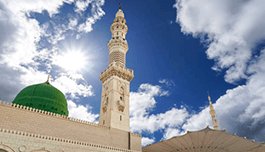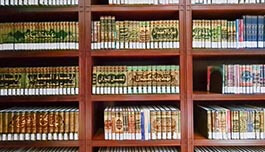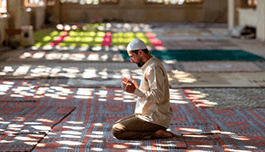The two Rak’ahs Sunnah before the Fajr prayer is the most rewarding of all the established Sunnah prayers according to ‘ijma (consensus) of the scholars of the four madhabs.
The Messenger of Allah ﷺ never missed these two units of voluntary prayer before the dawn prayer. He would also encourage his family and companions to maintain this virtuous act diligently.
Hadith 1 – They are better than the whole world and all it contains
Aisha reported that the Messenger of Allah ﷺ said: “The two rak’ahs before the dawn prayer are better than this world and all it contains.”
Narrated by Muslim in his “Sahih” (725) under the Chapter “It is recommended to pray two rak`ahs for the sunnah of Fajr. And encouragement to pray them regularly, and to make them brief, and to persist in offering them…” Also reported by Al-Tirmidhi (416), Al-Nasa’i (1759), Ibn Abi Shaybah (2/32/2), Al-Bayhaqi (2/470) and Ahmad (6/50 – 51, 149).
This narration highlights the immense virtue of the two rak’ahs before Fajr—they are more valuable than the entire world and everything within it.
Hadith 2 – They were dearer to the Prophet ﷺ than the whole world
‘Aisha reported that the Messenger of Allah ﷺ said about the two voluntary rak’ahs of the dawn: “They are dearer to me than the whole world.” (Narrated by Muslim in his “Saheeh” (725) and Ahmad (6/265)).
This hadith reflects the deep love and commitment of the Prophet ﷺ to these specific Sunnah prayers.
Hadith 3 – Build a house in Jannah
Praying the two rak‘ahs before Fajr as part of the twelve Sunnah rak‘ahs observed daily is a means by which a believer earns a house in Paradise.
Umm Habibah narrated that Allah’s Messenger ﷺ said: “Whoever prays twelve Rak’ahs in a day and night, a house will be built from him in Paradise: four before Ẓuhr, two after it, two after Maghrib, two after ʿIshāʾ, and two before the morning (Fajr) prayer.” (Narrated by Muslim (728) in the chapter “The virtue of the regular sunnah prayers before and after the obligatory prayers, and their numbers”, Abu Dawood (1250), Al-Tirmidhi (415), Al-Nasa’i (1808), Ibn Majah (1141) and Ahmad (26769)).
Hadith 4 – The Prophet would never miss them
These two rak’ahs before Fajr were so important to the Messenger of Allah ﷺ that he would not abandon them even when travelling, unlike the regular Sunnah prayers of Dhuhr, Maghrib and ‘Isha’ (Narrated by Muslim in his “Sahih” 680).
Ibn al-Qayyim (d. 751 AH) wrote: “The Messenger of Allah’s ﷺ consistency and diligence in maintaining the Sunnah of Fajr was stronger than in all other voluntary prayers. He never abandoned them, along with Witr, whether at home or during travel. In fact, while travelling, he was more regular with the Sunnah of Fajr and Witr than with any other non-obligatory prayers. No narration reports that he ﷺ offered any other regular Sunnah prayer during travel besides these.” (Zād al-Maʿād, 1/305)).
‘Aisha reported: “The Messenger of Allah ﷺ was not more regular in maintaining any of the voluntary prayers than he was with the two rak‘ahs of Fajr.” (Sahih al-Bukhari 1163, Sahih Muslim 724f)
In another report: “I have never seen the Messenger of Allah ﷺ hastening as much in observing supererogatory as two rak’ahs before the dawn prayer.” (Saheeh Muslim 724g and Ibn Khuzaymah in “Saheeh”, 1108)
In a third report she is reported to have said: “He offered two Rak’ahs in between the Adhan and Iqama of the Fajr prayer and he never missed them.” (Sahih al-Bukhari 1159)
Ibn Hajar al-Asqalani (d. 852 AH) said: “The saying: “And he never missed them” was cited as evidence for those who argue for its obligation as it was narrated from Al-Hasan Al-Basri. Ibn Abi Shaybah narrated it from him in the wording, “Al-Hasan used to consider the two rak’ahs before dawn to be obligatory.” The reference to “dawn” here means the Fajr prayer.
Al-Marghinani also transmitted something similar from Abu Hanifa. In the Jami’ of Al-Mahbubi (d.747 AH), from Al-Hasan ibn Ziyad, from Abu Hanifa: ‘If someone prayed these two rakat while sitting without an excuse, it would not be valid (just like the obligatory prayers are not accepted while sitting).’” (Fath al-Bari 3/35).
Abu Huraira reported: “The Prophet ﷺ overslept and missed the two rak‘ahs of Fajr, so he made them up after the sun had risen.” (Narrated by Ibn Majah (1155) and Ibn Khuzaymah (1117) with a Sahih chain).
The meaning is that the Prophet ﷺ slept past the time of Fajr prayer and only awoke after sunrise. He then prayed the two rak‘ahs of Sunnah for Fajr, followed by the obligatory Fajr prayer. This incident shows the significance of the Sunnah of Fajr, as the Prophet ﷺ made them up despite the time having passed. This practice was also reported from several other companions.
According to the Ḥanafī school, the Sunnah of Fajr is the only Sunnah prayer that can be made up if missed, unlike the other regular Sunnah prayers.
Hadith 5 – Do not omit them even if you are driven away by the enemy horses
Abu Huraira narrated that The Messenger of Allah ﷺ said: “Do not abandon them (the two rak’as before the dawn prayer), even if you are driven away by the horses.” (Narrated by Abu Dawood (1258) and Ahmad (9253) with weak isnaad).
Al-Munawi (d. 1031 AH), in Fath al-Qadir Sharh al-Jami’ al-Saghir, commented: “’Do not abandon the two rak’ahs of Fajr,’ meaning their performance, even if enemy horses chase you. Rather, pray them while riding or on foot, with gestures, even if not facing the qibla. This demonstrates the significant importance placed on the two rak’ahs of Fajr and emphasises the need for utmost diligence in performing them, whether in times of residence or travel, safety or fear.” (Fayd al-Qadeer, 6/393)
Conclusion
The two rak’ahs Sunnah before Fajr are no ordinary prayers—they are among the most beloved acts of worship to the Prophet ﷺ. He valued them more than the entire world and its riches, never abandoned them under any circumstances, and strongly urged his followers to maintain them.
Whoever observes them regularly, as part of the twelve Sunnah rak’ahs in a day and night, Allah will build for them a house in Paradise.
It is from the mercy and generosity of Allah ﷻ that such immense reward is attached to just two brief units of prayer—light on the limbs, short in duration, but heavy on the scales of good deeds on the Day of Judgement.






